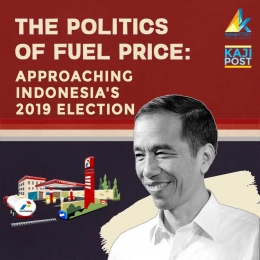At the same time, the government is cancelling $20 billion worth of infrastructure projects to pay for social welfare programs.
The price control might please voters, but it has received its fair share of criticism. First of all, this could reverse effort to reduce the public's excessive dependence on fossil fuel, which is undesirable because Indonesia is a net importer of oil and the sustainability of its supply is uncertain. Secondly, this could damage market confidence in Indonesia's commitment to fiscal discipline.
Jokowi's planned subsidy hike is relatively marginal in amount, which means that Pertamina will again be the sacrificial lamb. Pertamina is already losing billions of potential revenues from having to provide Premium outside Jamali, which is sold at below-market prices. Its finance will only deteriorate further with Jokowi's BBM Satu Harga program and recent instruction to start supplying Premium in Jamali again.
According to basic economics theory, price control distorts the market by eliminating the incentive for producers to supply the demanded amount. But the story is different when the producer is Pertamina, a state-owned enterprise.
If Pertamina was a private producer, it would respond to the price control by reducing supply, causing a deadweight loss in the form of a shortage. But since Pertamina is strictly instructed to maintain supply at low prices, the deadweight loss manifests in the bleeding finance of Pertamina.
Pertamina claimed that its net loss reached Rp3.9B in the first two months of 2018. The loss of potential revenue limits Pertamina's ability to make long-term productive investments, which could mean shortages in the future. Furthermore, the health of our state-owned enterprises really affects market sentiment towards Indonesia.
Prescription for Voter Myopia?
If these price interventions are likely to bite back, why is it being done every time? The root cause is the tendency of voters to favor short-term gains. This is especially true for a developing country such as Indonesia, where the majority of the population is still economically insecure, hence their myopic time-preference.
Tackling pernicious price controls, therefore, requires addressing this inherent nature. This might require more than educating voters, whose judgment is easily convoluted with non-economic considerations, but also structural measures on the political system.
One idea is to bind the government to certain policy decisions of their predecessor that require long-term consistency. Indonesia's Law No. 17 of 2003 about State Finance already caps the budget deficit at 3% of GDP, which could supposedly discourage wasteful spending, but the government was still able to shift fiscal burden to state-owned enterprises.
This loophole might need to be closed, such as by enforcing the government's obligation to compensate the losses of state-owned enterprises from price controls. Furthermore, there could be safeguards on projects with long-term value so they could not be easily sacrificed to fund populist welfare programs. These measures could be a way to replicate China's development success through consistent long-term planning, without becoming authoritarian.







